MercoPress. South Atlantic News Agency
Tag: China
-
Saturday, April 2nd 2016 - 08:07 UTC
Argentina and China reaffirm strategic relation and agree to review contracts
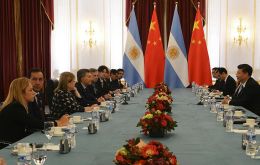
China has agreed to review contracts signed with Argentina, which need modifications, for the sake of transparency, according to Buenos Aires sources, but the overall strategic relation between the two countries and a raft of accords in different fields stands and is expected to continue to grow.
-
Thursday, March 31st 2016 - 00:14 UTC
Beijing reminds Argentina of the jigger sinking before a possible meeting of Macri with Xi Jinping
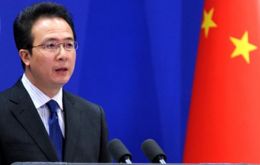
Beijing said that it “expects Argentina to perform according to law” in reference to the recent sinking of a Chinese flagged jigger by the country's Coast Guard and which was operating in Argentina's EEZ. The announcement is considered significant in Buenos Aires since Argentine president Mauricio Macri is expecting to meet his counterpart Xi Jinping in Washington, next Friday in the framework of the Nuclear security summit.
-
Monday, March 28th 2016 - 05:47 UTC
Macri visit to China in September: the strategic relation with Beijing stands, says Argentine ambassador
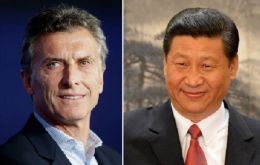
Argentine ambassador to Beijing Diego Guelar confirmed a meeting between President Mauricio Macri and his Chinese counterpart Xi Jinping next April first on the margins of the Nuclear Security Summit that begins next week in Washington and anticipated an official visit to China by Macri in September.
-
Wednesday, March 16th 2016 - 16:43 UTC
Beijing protests sinking of Chinese jigger and calls for a formal inquest into the incident
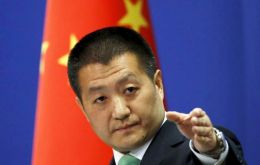
Beijing made a formal complaint to Argentina and expressed 'great concern' regarding the incident in which a Chinese flagged jigger caught red-handed fishing in the country's EEZ was fired at and sank on Tuesday. Chinese authorities also requested an “immediate inquest” into the procedure of the Argentine Coast Guard in the sinking of the vessel Lu Yuan Yu10.
-
Wednesday, March 16th 2016 - 06:05 UTC
Argentina sinks Chinese jigger which refused to stop and even tried to ram the patrol vessel

Argentina's coast guard has sunk a Chinese flagged jigger that was fishing illegally within its territorial waters, the coast guard said on Tuesday, marking a first test for relations between President Mauricio Macri and Beijing.In a high-seas chase, a coast guard vessel pursued the fishing vessel Lu Yan Yuan Yu 010 toward international waters, firing warning shots across the Chinese boat's bow as it attempted to raise the crew by radio.
-
Monday, March 7th 2016 - 04:47 UTC
China anticipates rough times as it tries to create jobs and restructure the economy

China faces a tough battle to keep its economy growing by at least 6.5% over the next five years while creating more jobs and restructuring inefficient industries, Premier Li Keqiang said as he opened China's annual parliament.
-
Tuesday, March 1st 2016 - 07:55 UTC
Chinese injects liquidity and helps boost volatile stock markets
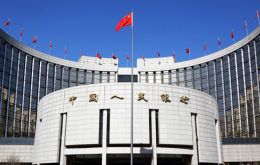
Chinese shares traded higher on Tuesday morning after a fresh stimulus push from the central bank to boost liquidity. The mainland benchmark Shanghai Composite rose 0.3% to 2,696.96 points.
-
Tuesday, March 1st 2016 - 07:32 UTC
China to the rescue of debt-burdened Petrobras with a US$10bn credit
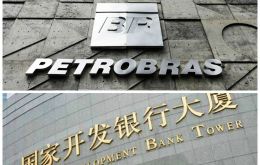
Bonds issued by Brazil's Petrobras ended one to two points higher on Monday as the beleaguered oil company eased refinancing pressure by clinching a US$10bn loan from China. The US$10bn loan from China Development Bank, which can be repaid in cash or oil, will do much to reduce refinancing risks for what is one of the world's most indebted companies.
-
Monday, February 29th 2016 - 09:03 UTC
G20: Beijing tailors generic final declaration with no specific mention to China's problems
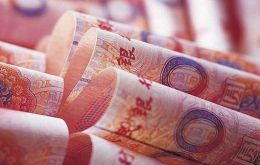
China pulled off a defensive win at the Shanghai Group of 20 (G20) meeting of global finance leaders after months of angst abroad over its economic and policy direction. For starters, there was no specific concern over China in the communiqué released late Saturday.
-
Monday, February 22nd 2016 - 08:28 UTC
Brazil heading for a record crop of 100 million tons of soybeans

As the soybean harvest gets under way in Brazil, analysts are having a clearer picture of whether the forecast record-setting crop will hit the century mark of 100 million tons despite hot and dry weather in Mato Grosso and northeastern Brazil as pods set and fill.
